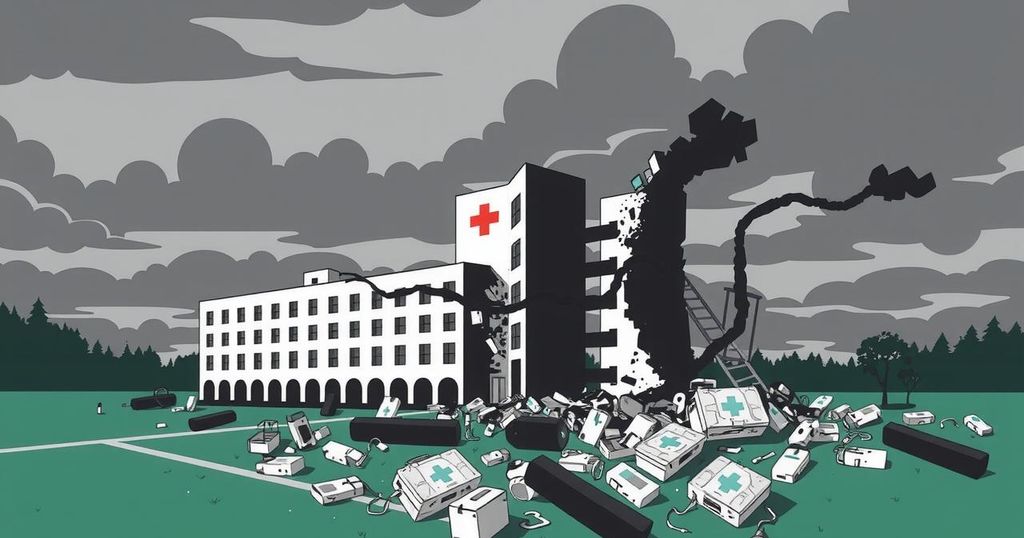Healthcare Attacks in South Sudan: A Crisis Striking Communities and Providers
Attacks on healthcare in South Sudan have resulted in severe consequences including the suspension of MSF outreach and hospital services. A shooting incident left staff traumatized, while further violence resulted in the looting of medical facilities, leaving communities without critical care. Urgent action is needed to protect healthcare workers and ensure medical access for vulnerable populations.
The consequences of attacks on healthcare in South Sudan are severe and dire for the people affected. Just this year alone, incidents involving Doctors Without Borders/Médecins Sans Frontières (MSF) highlight this troubling reality. In January, MSF boats were shot at while transporting medical supplies across the Sobat River, leading to the suspension of outreach activities for safety reasons. Furthermore, a hospital in Ulang was looted in April, halting all medical services offered by MSF. These events underscore the critical dangers faced by healthcare providers and patients alike in this conflict-ridden region.
The shooting incident on January 15 rattled the MSF outreach team as they were returning from Nasir County Hospital. While traveling in clearly marked boats, they were fired upon, prompting panic. Chuol, the team leader, reacted instinctively and jumped into the water, fearing the worst for his colleagues. Riek, a community liaison, heard the gunshots and did not know the fate of his team until he found an injured colleague who had also managed to escape. The incident has profoundly affected the mental well-being of both Chuol and Riek, with both admitting they struggled with sleeplessness and anxiety following the traumatic event.
Since MSF’s suspension of outreach activities, there has been a significant reduction in hospital patient numbers, according to Dr. Philip. The lack of transportation impacts patients, particularly those from remote areas. Many must wait days or weeks for a boat to reach the hospital, leading to poorer health outcomes. With critical cases unable to access timely care, hospital beds remain empty at a time when they are desperately needed. The situation is exacerbated by the devastation of roads, with many areas remaining inaccessible during the rainy season.
A particularly heartbreaking case involved a woman who arrived at the hospital too late to save her stillborn twins. Veronica, an MSF midwife, shared how the woman had delayed travel due to the inability of the mobile teams to reach her area. She felt anger and profound sadness as she faced the losses caused by the violence and unavailability of timely medical care.
Compounding the crisis, Ulang’s health infrastructure has deteriorated significantly due to ongoing violence. In April, armed individuals raided MSF’s facilities, looting crucial medical supplies and forcing a complete halt to services they provided. This left the local community devoid of any health care services, intensifying the hardships faced by the population.
The assaults on healthcare facilities are not isolated incidents. A grave attack in Old Fangak resulted in the bombing of a medical facility, obliterating the pharmacy—a crucial source of supplies for the area. David Charo Kahindi, who was present during the bombing, recounted the chaos as they fought to put out the fire amidst ongoing threats. He lamented the tragedy, noting that the hospital had served as a vital resource for over 100,000 people in the county. Now, the absence of such services significantly jeopardizes community health.
The continuous rise in violence dictates an urgent need for humanitarian access and protection for healthcare workers. The stark implications of these attacks emphasize that health facilities should remain safe zones, and perpetrators must be held accountable to prevent further suffering in South Sudan.
The attacks on healthcare in South Sudan have set off a catastrophic chain of events that leave communities vulnerable and without vital medical services. The troubling incidents involving MSF boats and facilities reveal not only the immediate risks posed to healthcare providers but also the dire consequences for patients who find themselves without timely access to care. As the violence escalates, it underscores the necessity for international attention, support for humanitarian efforts, and a commitment to safeguarding medical facilities in conflict zones.
Original Source: www.doctorswithoutborders.org




Post Comment